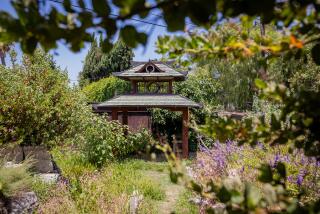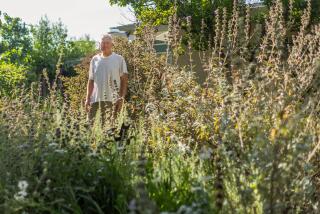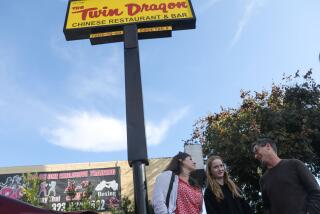Just Fronds? No, They’re Tradition
- Share via
Rafael Barragan was raised in Mexico as a Catholic. But as a gardener in Los Angeles’ Mid-Wilshire area, most of his customers are Jewish.
So the 46-year-old gardener cuts lawns by day and reads Maimonides’ code of Jewish law at night.
And for 27 years, he has helped Jewish families in Los Angeles celebrate the annual festival of Sukkot.
Barragan cuts fronds from palm trees in the neighborhood and gives them to those who build sukkahs, the makeshift structures for use during the celebration that started at sundown Wednesday.
Barragan spends hours helping older residents construct their own frond-covered booths, which according to the Bible represent shelters that the children of Israel lived in during the 40 years they wandered in the desert after the exodus from Egypt.
Sukkot comes five days after the annual Jewish Yom Kippur holiday. A tradition that is being observed by a growing number of Jewish families in Los Angeles, it offers a joyful counterpoint to that solemn day of atonement, which is marked by a 25-hour period of fasting.
Barragan knows how to make the sukkah structures, built of natural materials such as leafy branches. The roof covering is supposed to be thick enough to provide daytime shade but open enough to not obscure stars at night.
In fact, the self-taught Jewish scholar knows Hebrew tradition as well as many of those who will eat their meals inside their sukkahs during the seven-day celebration period.
“He’s read 4,000 years of Jewish history. He knows more than I do,” said Esther Kandel, a former Jewish history graduate student at Columbia University whose father is a rabbi. Every year, her father uses a frond-covered shelter roof crafted by Barragan.
“He’s read Flavius Josephus,” the circa-AD 65 Jewish historian, she said. “To read Maimonides, you have to have a philosopher’s mind. He’s reading beyond what I’m reading, and I’m a Jewish studies fellow at Columbia.”
Barragan, who arrived in the United States after finishing only junior high school in his native Mexico, is modest about the help he gives his Jewish friends -- some of whom are gardener clients and some of whom are not.
“It’s like a mitzvah for me. I’m very grateful to these people. They’ve helped me put food on my family’s table for 27 years,” he said of his work for those whose Sukkot dinner tables are beneath his fronds.
Some of the sukkah shelters Barragan helped build this year are elaborate. The one covering the patio of Rabbi Herman Roszler’s home on La Jolla Avenue has dried vegetables hanging from the roof and decorations on its walls.
“The decorations are symbols of the harvest season,” said Roszler, displaying a rolled palm branch, three myrtle leaves and a pair of willow branches that are used with a piece of citrus fruit in reciting blessings inside the sukkah.
“Every year, he puts all this up. Without him, we’re lost,” Roszler’s wife, Maureen, said of Barragan.
Rabbi Herbert Richtman, a friend visiting from New York City, pronounced the shelter properly built. “The Bible says we’re supposed to dwell in the sukkah. It’s a temporary home,” he said Wednesday afternoon.
Nearby, Rabbi Baruch Cohon was beginning to decorate his small wood-framed sukkah with cards for the recent Jewish New Year as Barragan attached a few final fronds to its sides. “We want to make it attractive,” Barragan explained.
Cohon said Barragan helps him each year, even though he is not his gardener.
“He knows us and likes to help us. I don’t feel comfortable climbing that tree myself to get the branches,” Cohon said, pointing toward a palm above his Whitworth Drive home.
Barragan said he cuts palm fronds and stacks them along streets for others to use on their sukkahs. He said he intended to cut more branches today in the neighborhood south of Olympic Boulevard.
But this may be the last time. After 27 Sukkot celebrations, Barragan plans to quit gardening in December and open a restaurant and a Mexican-style food-processing company near his Van Nuys home.
He said he will miss the South Carthay neighborhood -- and its Jewish residents’ traditions.
“I planted 170 jacaranda trees here in 1980 from 5-gallon pots,” he said, gazing at the leafy branches that blend in with the area’s tall palms. “They’ve done well here.”
So has he. “People here have treated me well. Helping them at Sukkot has been a way of saying thanks.”







